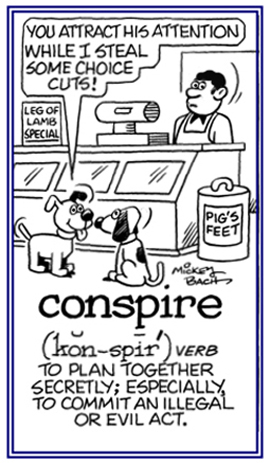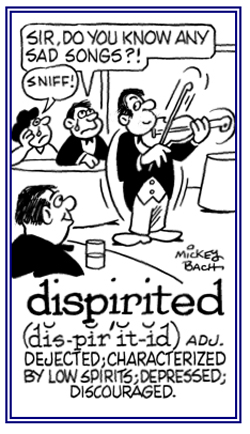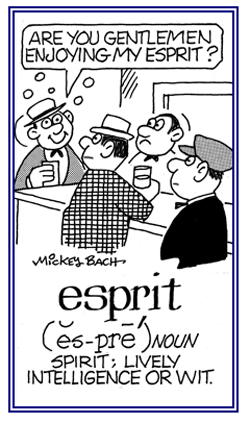spiro-, spir-, spira-, spirat-, -spire, -spiring, -spiration, -spirational
(Latin: breath of life, breath, breathing; mind; spirit, "soul"; courage)
Don't confuse this spiro-, with another spiro- meaning "coil, twisted".
1. Anyone who secretly makes a plan with another person or group to do something bad or illegal; especially, in a political situation.
2. A member of a group of people who plan, or agree in secret, to commit an illegal or subversive act.
2. A member of a group of people who plan, or agree in secret, to commit an illegal or subversive act.
conspire (verb), conspires; conspired; conspiring
1. To plan or to agree in secret with others to commit an illegal or subversive act: During the trial, the defendant would not admit that he had conspired against the president of his company.
2. To combine so as to cause a particular result, often one involving harm, inconvenience, or difficulty: The rabbits appeared to be conspiring with each other to eat the lettuce in Mary's garden.
3. To act jointly with another person, or other people, for a common purpose or result: The pilot's strike seemed to conspire to delay Jim's flight during his business trip.
4. Etymology: from Latin conspirare, "to agree, to unite, to plot"; literally, "to breathe together"; from com-, "together" + spirare, "to breathe".

© ALL rights are reserved.
Go to this Word A Day Revisited Index
2. To combine so as to cause a particular result, often one involving harm, inconvenience, or difficulty: The rabbits appeared to be conspiring with each other to eat the lettuce in Mary's garden.
3. To act jointly with another person, or other people, for a common purpose or result: The pilot's strike seemed to conspire to delay Jim's flight during his business trip.
4. Etymology: from Latin conspirare, "to agree, to unite, to plot"; literally, "to breathe together"; from com-, "together" + spirare, "to breathe".

Go to this Word A Day Revisited Index
so you can see more of Mickey Bach's cartoons.
conspiringly (adverb), more conspiringly, most conspiringly
dispirit (verb), dispirits; dispirited; dispiriting
dispirited (adjective), more dispirited, most dispirited
Conveying a feeling of unhappiness and without enthusiasm or hope: The loss of the championship game resulted in a very dispirited team of basketball players; as well as, their supporters .

© ALL rights are reserved.
Go to this Word A Day Revisited Index

Go to this Word A Day Revisited Index
so you can see more of Mickey Bach's cartoons.
dispiritedly (adverb), more dispiritedly, most dispiritedly
dispiritingly (adverb), more dispiritingly, most dispiritingly
Dum spiro spero.
Translation: While I have breath, I hope.
One of two mottoes of the State of South Carolina, USA. The other motto is Animis opibusque parati, "Prepared in minds and resources."
Lively wit or intelligence; especially, of comprehension and expression: Morgan amused other students with his entertaining esprit in his classes and during social gatherings.

© ALL rights are reserved.
Go to this Word A Day Revisited Index

Go to this Word A Day Revisited Index
so you can see more of Mickey Bach's cartoons.
1. A feeling of pride, fellowship, and common loyalty shared by the members of a particular group of people.
2. A sense of unity and of shared interests and responsibilities that have been developed by people who are closely associated in a task, a cause, an enterprise, etc.
3. Etymology: from late 18th century French; literally, "spirit of the body".
2. A sense of unity and of shared interests and responsibilities that have been developed by people who are closely associated in a task, a cause, an enterprise, etc.
3. Etymology: from late 18th century French; literally, "spirit of the body".
The total loss of water from a particular area, equal to the sum of the amount of water lost by the removal of moisture from the soil, and other surfaces, and the amount lost by the emission of water from plants: "Evapotranspiration involves the combined removal of water from surfaces by the loss of moisture and from the outward passage of fine particles of water along with carbon dioxide from plants."
"Evapotranspirations are the combined removals of water from surfaces by evaporation and from plants by transpiration."
1. The end of a time during which an offer or an agreement is no longer in force: Two weeks after the expiration of the construction, Jim and his family were able to move into their new house.
2. The act of breathing out: "Sam's doctor had him go through the process of inhalation and expiration in order to check his breathing condition.
2. The act of breathing out: "Sam's doctor had him go through the process of inhalation and expiration in order to check his breathing condition.
expiratory (adjective), more expiratory, most expiratory
expire (verb), expires; expired; expiring
1. To be no longer valid after a period of time: "Dee's driver's license is about to expire."
2. To die: "Audra's aunt expired after an extended illness."
3. To breath air out: "The doctor measured the the volume of air that Rhoda expired from her lungs."
2. To die: "Audra's aunt expired after an extended illness."
3. To breath air out: "The doctor measured the the volume of air that Rhoda expired from her lungs."


